
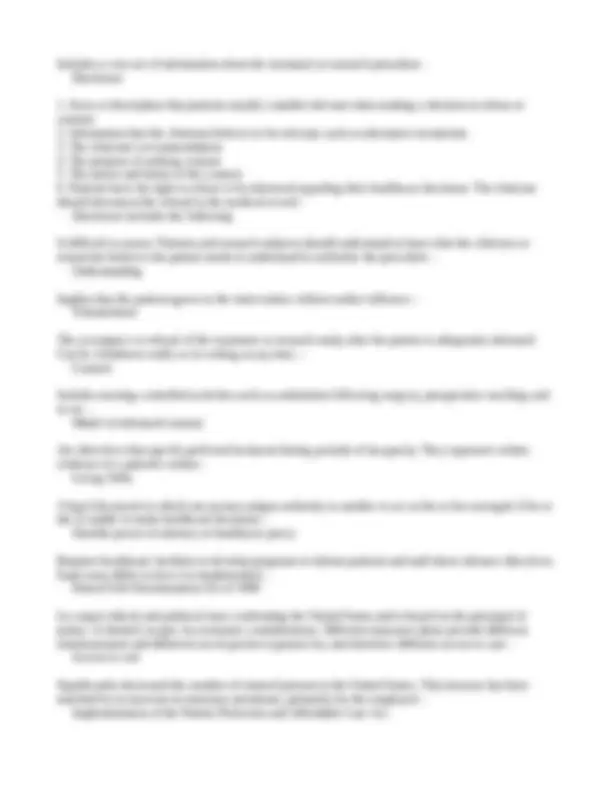
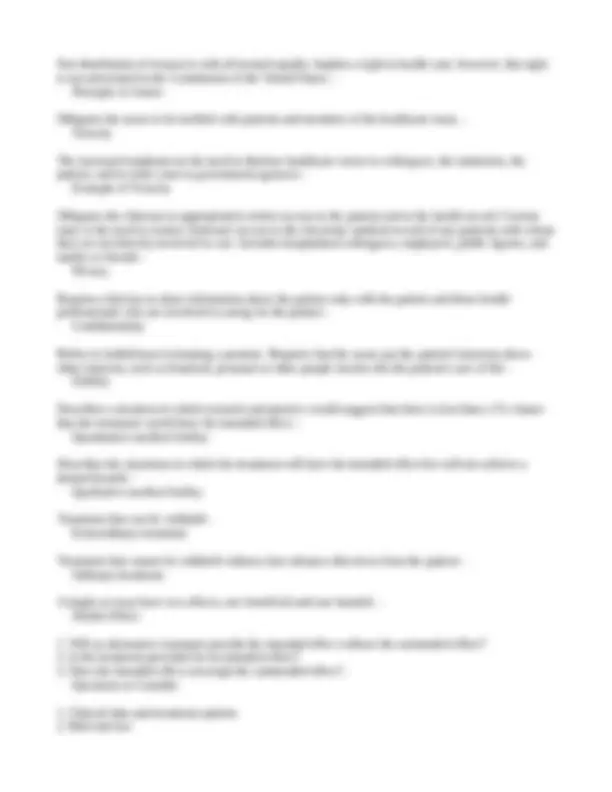
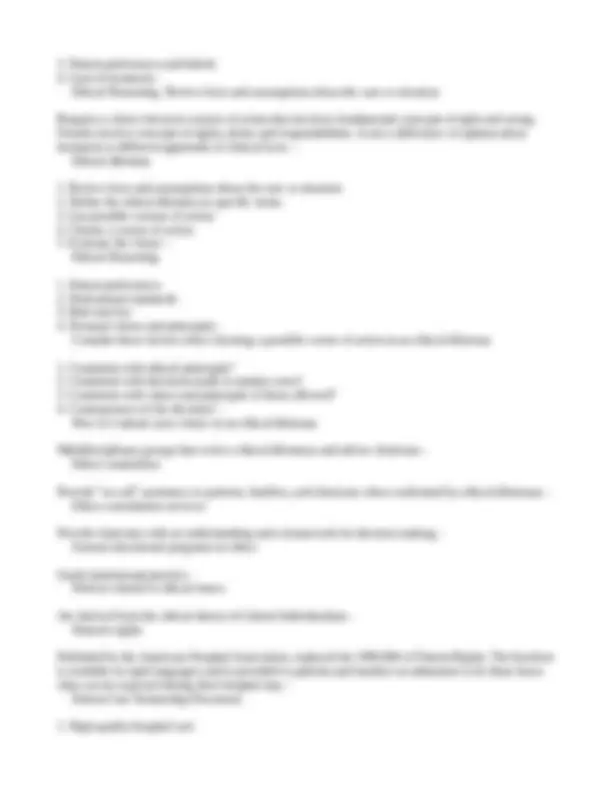
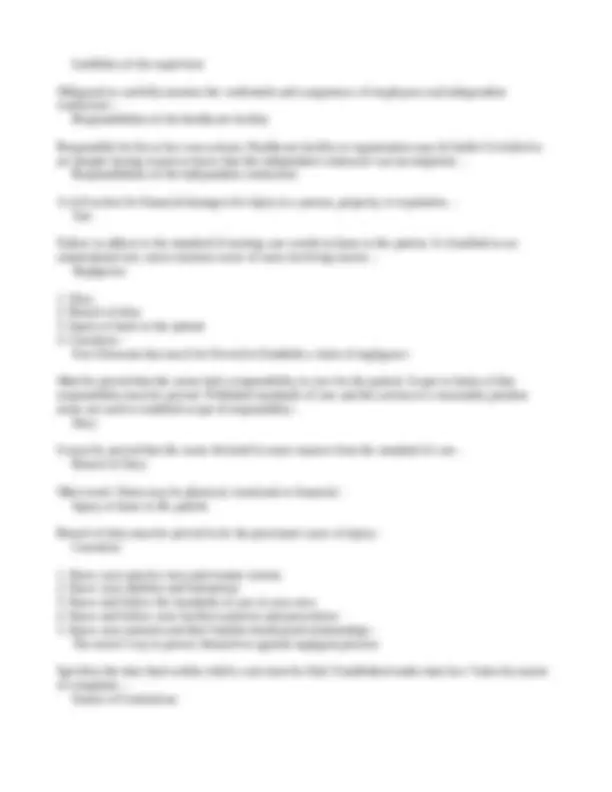
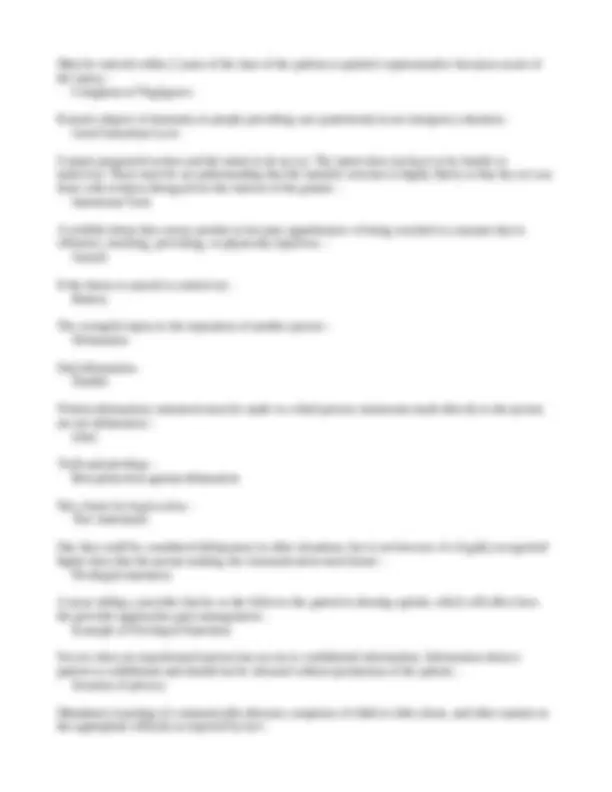



Study with the several resources on Docsity

Earn points by helping other students or get them with a premium plan


Prepare for your exams
Study with the several resources on Docsity

Earn points to download
Earn points by helping other students or get them with a premium plan
Community
Ask the community for help and clear up your study doubts
Discover the best universities in your country according to Docsity users
Free resources
Download our free guides on studying techniques, anxiety management strategies, and thesis advice from Docsity tutors
ANCC Cardiac-Nursing Certification Exam_ Ethical and Legal Issues.docx
Typology: Exams
1 / 10

This page cannot be seen from the preview
Don't miss anything!







The systematic study of moral conduct and provides the framework for studying and examining moral dilemmas - Ethics The study of moral conduct within the context of health care - Bioethics Refers to norms about right and wrong human conduct that form a social consensus - Morality Socially valued character traits - Moral Virtues Compassion, discernment, trustworthiness, integrity, conscientiousness - Five moral virtues for health professionals Combines active regard for another's welfare with an emotional response of sympathy, tenderness and discomfort at another's misfortune or suffering - Compassion The ability to make judgments and decisions without being unduly influenced by extraneous conditions
Veracity, respect the privacy of others, protect confidential information, obtain consent for interventions with patients, when asked, help others make important decisions - Clinicians show respect for autonomy when they engage in the following behaviors Truth-telling - Veracity The principal of fairness. To treat others equally. To refrain from discrimination - Justice Based on the respect for autonomy. - Informed consent Includes the ability to understand and make decisions. Is specific not global. It depends on the match between the patient's abilities and the specific decision-making task. May vary over time or be intermittent. - Decisional capacity Physiological such as illness or hypoxia or situational factors such as medically naive person admitted to the emergency department - Factors that may affect decisions making capacity It is appropriate to assess his or her understanding deliberative capacity and coherence over time, and to consult with an expert when necessary - If the patient's decisional capacity cannot be established initially Are authorized to make decisions for patients when decisional capacity is impaired. Compelled ethically and legally to act in the patient's best interests - Surrogate decision-makers The surrogate decision-maker is required to make the decision that the incompetent patient would have made if competent. Surrogates may have written evidence of a person's wishes via a living will or letter, oral evidence via conversation or they may make inferences based on the person's history of relevant choices - Substituted judgment standard If the surrogate has no way of knowing what choice a person would have made. The surrogate should choose the option that appears to be in the best interests of the patient. - Best interests standard
Fair distribution of resources with all treated equally. Implies a right to health care; however, this right is not articulated in the Constitution of the United States. - Principle of Justice Obligates the nurse to be truthful with patients and members of the healthcare team. - Veracity The increased emphasis on the need to disclose healthcare errors to colleagues, the institution, the patient, and in some cases to government agencies - Example of Veracity Obligates the clinician to appropriately restrict access to the patient and to the health record. Current issue is the need to restrict clinician's access to the electronic medical record of any patients with whom they are not directly involved in care. Includes hospitalized colleagues, employees, public figures, and family or friends - Privacy Requires clinician to share information about the patient only with the patient and those health professionals who are involved in caring for the patient - Confidentiality Refers to faithfulness in keeping a promise. Requires that the nurse put the patient's interests above other interests, such as financial, personal or other people involve din the patient's care of life - Fidelity Describes a situation in which research and practice would suggest that there is less than a 1% chance that the treatment would have the intended effect. - Quantitative medical futility Describes the situations in which the treatment will have the intended effect but will not achieve a desired benefit - Qualitative medical futility Treatment that can be withheld - Extraordinary treatment Treatment that cannot be withheld without clear advance directives from the patient - Ordinary treatment A single act may have two effects, one beneficial and one harmful. - Double Effect
A legal recognition that enables one to practice in a profession such as nursing - Licensure Protects the public health, safety and welfare. All states require licensure for nursing practice. - Legal Regulation of Nursing Practice State laws that grant the right to practice nursing to people who meet predetermined standards. - Nurse practice acts Are created under the nurse practice act and govern nursing practice in the state - Regulatory boards
Liabilities of the supervisor Obligated to carefully monitor the credentials and competence of employees and independent contractors - Responsibilities of the healthcare facility Responsible for his or her own actions. Healthcare facility or organization may be liable if it failed to act despite having reason to know that the independent contractor was incompetent. - Responsibilities of the independent contractors A civil action for financial damages for injury to a person, property, or reputation. - Tort Failure to adhere to the standard of nursing care results in harm to the patient. Is classified as an unintentional tort, most common cause of cases involving nurses. - Negligence
What is not considered an invasion of privacy Disclosure to the general public, media or other interested parties. Clinicians who access information about patients for whom they do not have direct responsibility are invading the privacy of those patients and may be subject to institutional and civil penalty - Examples of Invasion of Privacy False or misleading statements that the patient relies on to his or her detritement - Fraud and misrepresentation The unlawful restriction of the freedom of a person, including physical restraint - False Imprisonment